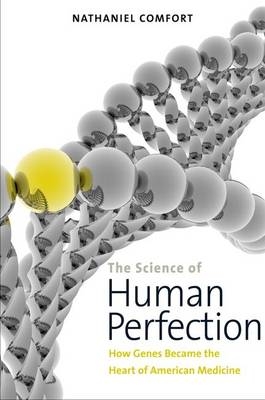
The Science of Human Perfection
Seiten
2012
Yale University Press (Verlag)
978-0-300-16991-1 (ISBN)
Yale University Press (Verlag)
978-0-300-16991-1 (ISBN)
- Titel ist leider vergriffen;
keine Neuauflage - Artikel merken
A thoughtful new look at the entwined histories of genetic medicine and eugenics, with probing discussion of the moral risks of seeking human perfection
Almost daily we hear news stories, advertisements, and scientific reports promising that genetic medicine will make us live longer, enable doctors to identify and treat diseases before they harm us, and individualize our medical care. But surprisingly, a century ago eugenicists were making the same promises. This book traces the history of the promises of medical genetics and of the medical dimension of eugenics. While mindful of the benefits of genetic medicine, the book also considers social and ethical issues that cast troublesome shadows over these fields. Keeping his focus on America, Nathaniel Comfort introduces the community of scientists, physicians, and public health workers who have contributed to the development of medical genetics from the nineteenth century to today. He argues that medical genetics is closely related to eugenics, and indeed that the two cannot be fully understood separately. He also carefully examines how the desire to relieve suffering and to improve ourselves genetically, though noble, may be subverted.
History makes clear that as patients and consumers we must take ownership of genetic medicine, using it intelligently, knowledgeably, and skeptically.
Almost daily we hear news stories, advertisements, and scientific reports promising that genetic medicine will make us live longer, enable doctors to identify and treat diseases before they harm us, and individualize our medical care. But surprisingly, a century ago eugenicists were making the same promises. This book traces the history of the promises of medical genetics and of the medical dimension of eugenics. While mindful of the benefits of genetic medicine, the book also considers social and ethical issues that cast troublesome shadows over these fields. Keeping his focus on America, Nathaniel Comfort introduces the community of scientists, physicians, and public health workers who have contributed to the development of medical genetics from the nineteenth century to today. He argues that medical genetics is closely related to eugenics, and indeed that the two cannot be fully understood separately. He also carefully examines how the desire to relieve suffering and to improve ourselves genetically, though noble, may be subverted.
History makes clear that as patients and consumers we must take ownership of genetic medicine, using it intelligently, knowledgeably, and skeptically.
Nathaniel Comfort is associate professor, Department of the History of Medicine, Johns Hopkins University, and a participant in The Oral History of Human Genetics project.
| Zusatzinfo | 25 integrated black-&-white illustrations |
|---|---|
| Sprache | englisch |
| Themenwelt | Medizin / Pharmazie ► Medizinische Fachgebiete |
| Studium ► 2. Studienabschnitt (Klinik) ► Humangenetik | |
| Studium ► Querschnittsbereiche ► Geschichte / Ethik der Medizin | |
| Naturwissenschaften ► Biologie ► Genetik / Molekularbiologie | |
| ISBN-10 | 0-300-16991-4 / 0300169914 |
| ISBN-13 | 978-0-300-16991-1 / 9780300169911 |
| Zustand | Neuware |
| Haben Sie eine Frage zum Produkt? |
Mehr entdecken
aus dem Bereich
aus dem Bereich
Buch | Hardcover (2012)
Westermann Schulbuchverlag
CHF 44,90
Schulbuch Klassen 7/8 (G9)
Buch | Hardcover (2015)
Klett (Verlag)
CHF 29,90
Buch | Softcover (2004)
Cornelsen Verlag
CHF 23,90


